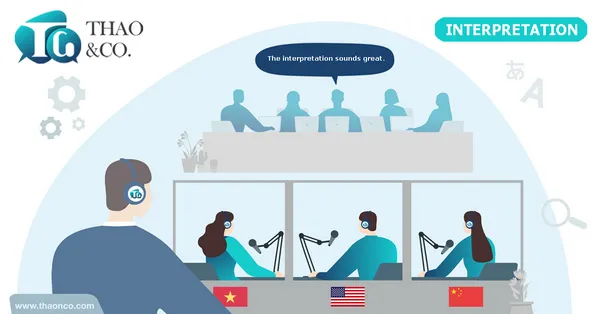Chinese is recognized as one of the most important and widely used languages in the world. With China’s rapid economic growth and ever-growing role on the global stage, the demand for Chinese interpreters has increased remarkably.
In this article, we delve into what it takes to get Chinese interpreter jobs and how much one can earn as a Chinese interpreter.
Chinese interpreters are professionals who convert spoken words from Chinese to another language and vice versa. With their linguistic competence, they act as a bridge between the parties involved, ensuring they fully and accurately understand one another.
They typically perform their duties in multinational settings, such as in international conferences or meetings. As interpreters, they have quick and agile minds that help them receive an idea in one language, process it, and deliver it in another in no time while still preserving the original tone and intent.
To succeed in this career, Chinese interpreters are required to have a high level of Chinese proficiency and an in-depth knowledge of Chinese culture and customs.
They must also possess excellent communication skills and the ability to work well under pressure. Plus, being creative in how they convey ideas while preserving accuracy is another essential quality of interpreters.
To make a career in Chinese interpretation, keep in mind the following requirements:
If you are an aspiring Chinese interpreter, it is recommended to pursue an associate’s or bachelor’s degree in Chinese Studies or Business Chinese. These qualifications demonstrate your mastery of the necessary linguistic knowledge and specialized skills required for a career as a Chinese interpreter.
Having an HSK certificate of level 4 or above can be a huge advantage, as it showcases your comprehensive proficiency in Chinese, encompassing skills in reading, writing, listening, and speaking. This certificate is widely accepted in the industry and can enhance your employment prospects.
Having hands-on experience is a crucial factor in becoming a proficient interpreter. You can gain experience by participating in interpreting projects or applying for an in-house interpreter position at a multinational organization. Practical work experience not only enhances interpreting skills but also broadens your network, making the job search easier.
Consistently improving your Chinese proficiency and domain expertise is a must-do. You can enrich your knowledge by attending courses, workshops, and seminars related to the Chinese language and Chinese interpretation. Continual learning allows you to stay abreast of emerging trends, thereby ensuring your relevance in your field and enhancing your competitiveness as an interpreter.
For instance, if you want to become a Chinese medical interpreter, there’s no doubt that you need to gain expertise in medicine, apart from language. This also necessitates a lifelong learning mindset to stay updated with medical advancements and language nuances.
In the journey of becoming a Chinese interpreter, qualifications alone cannot carve the path to success. It is the fusion of qualifications, professional experience, and a commitment to continuous learning that truly distinguishes you in this field.

Besides the passion for Chinese, here are some must-have qualities of a Chinese interpreter:
A Chinese interpreter must possess not only excellent listening, reading, writing, and speaking skills, but also the ability to comprehend and utilize sector-specific Chinese vocabulary, grammar, and terminology.
The Chinese language uses a system of complex ideogrammatic characters called Hanzi. Learning and memorizing 50,000 characters can be a daunting challenge for learners of this language.
Understanding Chinese culture, customs, social norms, and values helps the interpreter communicate across cultures effectively. Like any other language, Chinese is closely linked to the country’s culture and history.
Therefore, the ability to navigate Chinese cultural nuances is essential for accurate interpretation of the source messages.
The role of an interpreter necessitates strong comprehension skills in Chinese and the capacity to effortlessly and accurately translate the heard content from one language to another. Chinese is a tonal language in which tones determine the meaning of a word.
Chinese learners may have difficulties getting these tones right and differentiating between words that share the same syllable but have different tones, as in the classic example of mā (mother), má (hemp), and mǎ (horse).
Having strong communication skills enables interpreters to interpret effectively. Elements such as attentive listening, clarity in expression, brevity, and a confident demeanor are also especially crucial when engaging with the parties involved.
Before an interpreting session, it is vital for interpreters to research the relevant subject using reliable sources. This ensures they are adequately prepared to provide their service effectively.
Agility and the ability to work well under pressure are two essential attributes of interpreters. The importance of these two qualities becomes even greater when it comes to simultaneous interpretation. Besides, interpreters also need to be creative and quick-witted to solve problems that arise during the interpreting session.
Aside from linguistic competencies, adept soft skills, an articulate voice, good pronunciation, and eagerness to learn are some other vital traits of a proficient interpreter. Cultivating these qualities can help you succeed as a Chinese interpreter.
Different sectors and businesses demand a different type of Chinese interpreter.
The responsibility of an in-house Chinese interpreter working full-time for a business involves tasks such as interpreting in internal or partnership meetings, expeditions, field inspections, and other activities of the company.
Consecutive interpretation is typically employed for this job. The interpreter has to ensure that all the information and ideas discussed and exchanged by the parties involved are conveyed fully and accurately.
In some cases, a full-time Chinese interpreter can also be in charge of contacting and communicating with Chinese-speaking relevant parties and partners of the company. For these duties to be fulfilled, an in-house Chinese Interpreter must have excellent Chinese communication skills.
Recent years have also witnessed the important role of Cantonese interpreters in various conferences and events. Additionally, the need for Mandarin interpreter jobs has been phenomenal.
Chinese freelance interpreters commonly provide their services in settings, such as business meetings with international partners and global conferences or events. It is their responsibility to ensure the meaning of the original statements is conveyed accurately and efficiently, fostering understanding between the concerned parties.
Unlike in-house interpreters, freelance interpreters need to be able to perform various types of interpretation to cater to the divergent needs of the marketplace. For example, conferences typically demand Chinese simultaneous interpretation, whereas the healthcare sector often requires over-the-phone interpretation.
Freelance Chinese interpreters can work in a variety of settings, such as business, finance, healthcare, judiciary, technology, education, and others. This requires the interpreters to have a broad technical vocabulary and profound specialized knowledge of the field they are dealing with.

Mandarin interpreter salary is influenced by many factors, including:
In the United States, a Chinese interpreter earns an average of about USD 60,000 per year. The hourly rate for a freelance Chinese interpreter is USD 20.
In Vietnam, the monthly salary range typically falls between VND 12 million and VND 17 million and could be higher for highly skilled and experienced interpreters. Freelancers, on the other hand, are typically paid VND 300,000 for each hour of their interpreting service.
That being said, to estimate the exact pay rate, there needs to be more information about the field and other factors related to the job. It’s best to discuss your pay in detail with your employer or client or research the current market rate in your area.
If you are in search of a freelance Chinese interpreter, job sites like Indeed, LinkedIn, Glassdoor, and CareerBuilder are some trustworthy platforms. You can also make use of other popular marketplaces for translators, interpreters, and freelancers such as ProZ, Translators Cafe, Upwork, Freelancer, and Fiverr.
Posting your job on forums, Facebook groups, LinkedIn groups, and other online community platforms for those involved in Chinese translation is another great way to find your ideal interpreter.
Alternatively, you may utilize your professional connections by seeking referrals from those already established in the field. This helps find the most reliable and competent interpreter for your project.
Another quick and convenient way worth considering is to use the interpreting service of a reputable translation agency in your locality. A company specializing in language services will have an extensive network of competent Chinese interpreters working in multiple sectors, thereby catering to any of your interpreting needs.
Over the years, Thao & Co. has built a team of skilled and experienced Chinese interpreters specializing in a variety of domains. Our interpreters can handle with ease and efficiency any type of interpreting, from simultaneous to consecutive or escort interpretation, aiding you in overcoming language barriers and achieving your goals.

What makes our Chinese interpreting services stand out in the market:
![]() High level of expertise: At Thao & Co., we uphold stringent qualification criteria for our Chinese interpreters. Specifically, they are required to possess a bachelor’s degree in Chinese Studies and an HSK certificate of level 5 or above. They all have in-depth linguistic, cultural, and specialized knowledge, which ensures the accuracy of their interpretation.
High level of expertise: At Thao & Co., we uphold stringent qualification criteria for our Chinese interpreters. Specifically, they are required to possess a bachelor’s degree in Chinese Studies and an HSK certificate of level 5 or above. They all have in-depth linguistic, cultural, and specialized knowledge, which ensures the accuracy of their interpretation.
![]() Communication skills: Besides being fluent in Chinese, our interpreters also possess essential interpersonal skills that enable them to communicate with tact, diplomacy, and professionalism. This helps facilitate seamless and effective communication during the interpreting session and ensures the speaker’s intended meaning is delivered clearly and accurately.
Communication skills: Besides being fluent in Chinese, our interpreters also possess essential interpersonal skills that enable them to communicate with tact, diplomacy, and professionalism. This helps facilitate seamless and effective communication during the interpreting session and ensures the speaker’s intended meaning is delivered clearly and accurately.
![]() Cross-domain experience: We have extensive experience working in a variety of settings such as healthcare, finance, engineering, and others. To accommodate the needs of clients of different industries, we offer a wide range of interpreting services, including the most challenging types like simultaneous interpretation, whisper interpretation, and relay interpretation.
Cross-domain experience: We have extensive experience working in a variety of settings such as healthcare, finance, engineering, and others. To accommodate the needs of clients of different industries, we offer a wide range of interpreting services, including the most challenging types like simultaneous interpretation, whisper interpretation, and relay interpretation.
![]() Confidentiality: We place utmost importance on protecting your privacy. Thao & Co. adheres to strict confidentiality protocols and has all interpreters sign a Non-Disclosure Agreement to ensure your information is completely secured.
Confidentiality: We place utmost importance on protecting your privacy. Thao & Co. adheres to strict confidentiality protocols and has all interpreters sign a Non-Disclosure Agreement to ensure your information is completely secured.
![]() Professional customer service: Our professional and dedicated customer support team is always ready to assist you in choosing the best-suited Chinese interpreting service. Satisfying your needs is our top priority. We pay close attention to your demands and provide personalized services to help you achieve your desired outcome.
Professional customer service: Our professional and dedicated customer support team is always ready to assist you in choosing the best-suited Chinese interpreting service. Satisfying your needs is our top priority. We pay close attention to your demands and provide personalized services to help you achieve your desired outcome.
We are aware that interpreters play a critical role in any interpreting project. Therefore, we attach particular importance to recruitment and training to build a team of excellent interpreters who can help bring your project to success.
For further information about our services, please leave your contact information on our Get a Quote page and we’ll get back to you within 24 hours!